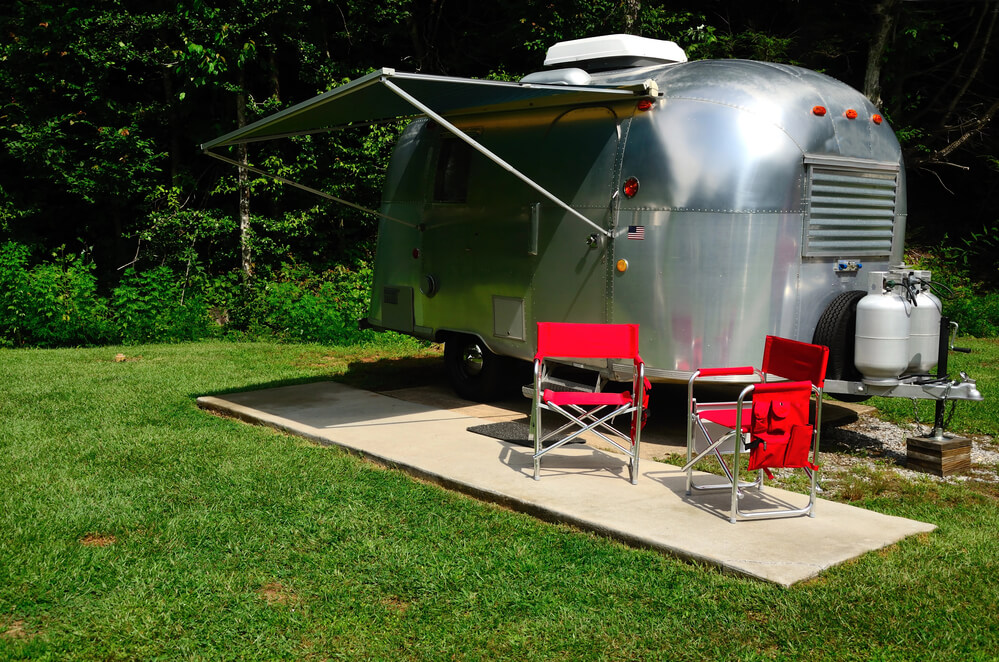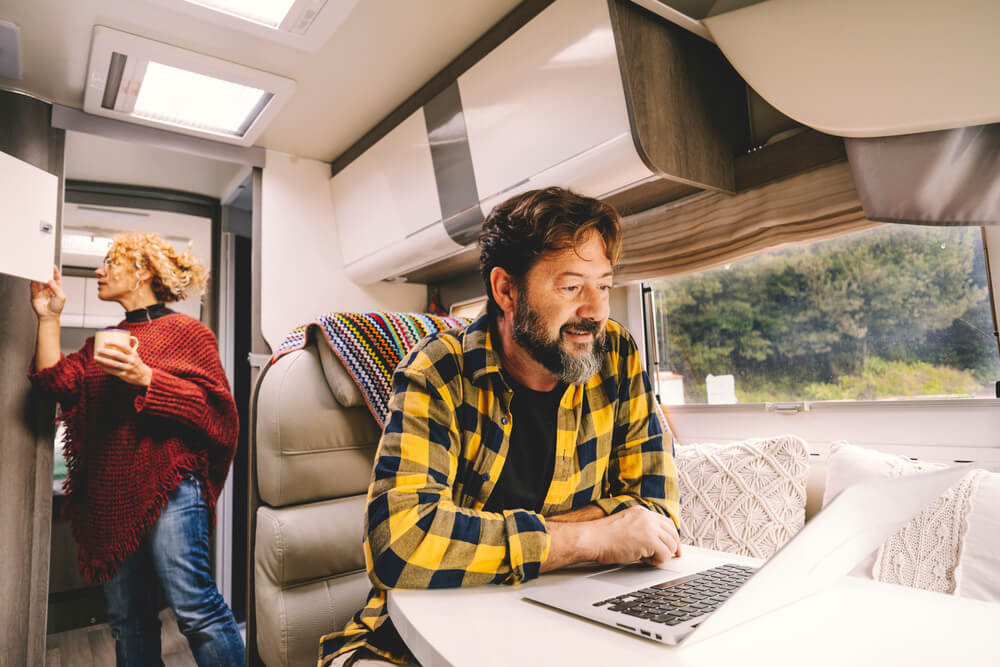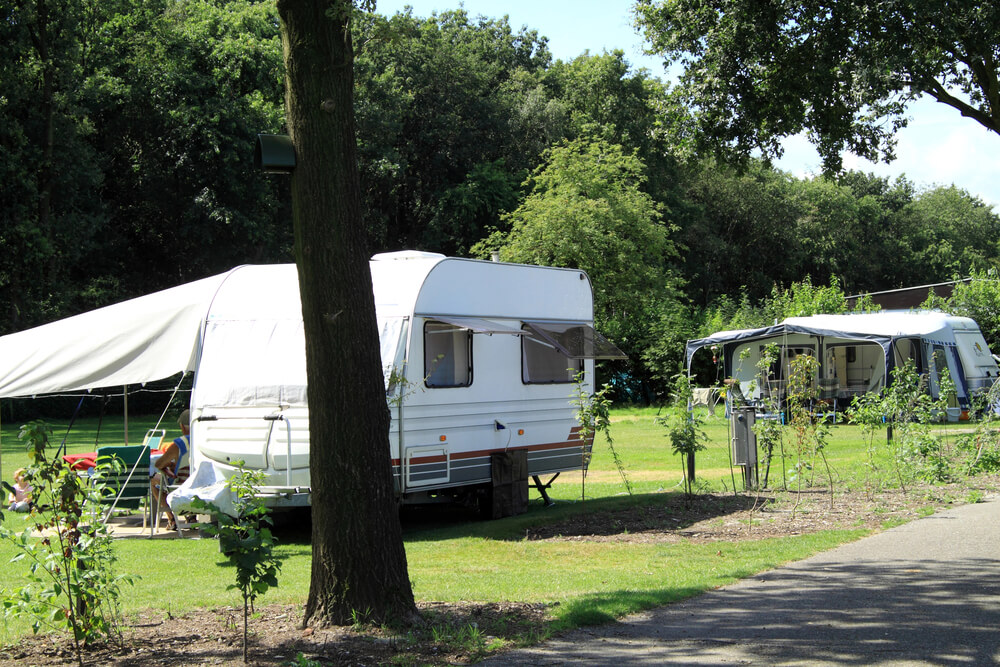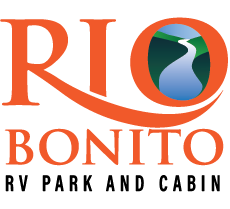If you work in an occupation that requires extended travel, then you’re likely already aware of the current less-than-ideal housing market in Texas. Research indicates that over half of the total number of renters in Texas spend more than 30% of their income on rent and utility payments.
If you are looking for a cost-effective way to make the most of your extended stay in Texas, consider living in a small RV! Any size RV can be the perfect “home away from home” while you work.
Turning to RV living may be an adjustment for some. We’ve got some tricks up our sleeve that can make the whole process easier.
Can you live in a small RV?

To be clear, you can absolutely live in a small RV! They make for great living quarters for as short or long of a timespan as you need.
Any RV under 24 ft long is generally considered “small.” However, this space usually contains all of the features you would look for in an apartment, including a designated sleeping area, a separate bathroom area, and some common living space. Many small RV models feature fold-outs that can add to your total wall and floor space when you’re parked. You may even have an RV with Murphy beds, so you can sleep more people in your RV.
Is living in a small RV financially smart?
Living in a small RV is one of the smartest financial decisions you can make. Once you purchase an RV – often at a fraction of the total cost of a single-family home – it’s yours. No rental or mortgage payment required.
Of course, RV living still comes with expenses. You’ll need to factor in fees charged by your chosen RV park or campsite of choice for using their space. Different RV parks will charge different rates for the use of utilities like power and sewage. If you intend to travel while living in an RV, you should factor in gas money, too. However, the chances are high that you will come out significantly further ahead than you would if you chose to temporarily move into a home.
Tips for living in a small motorhome

Switching to small RV living can feel like a major shift for those who are leaving their homes for a few months for work or other shorter-term purposes. Fortunately, we know all of the best advice for first-time RV community members.
1. Get insured
You wouldn’t live in an apartment or a home without the appropriate insurance; the same applies to your RV. Insurance for your RV can help pay for costs related to both the “car” part and the “home” part of your RV. This helps keep you covered for any accident that may occur while driving or parked. If you already have home or renter’s insurance, talk to your insurance carrier about potential bundling options that could save you money.
2. Invest in your power
Your RV camp or park of choice may have power hookups available to you for a price. However, if you plan on taking your RV with you on longer trips, it’s smart to have your own power sources available. Consider purchasing a dedicated battery charger for your RV, especially if your battery takes a while to charge. You may also want to consider switching to LED lights to increase their longevity.
Are you into green energy? Consider adding a solar panel to your RV or purchasing an RV with solar power capabilities already built in.
3. Get connected on the go
Even if you don’t work remotely, it’s probably important to you to have reliable internet on your RV. However, your RV probably won’t have the traditional hardwiring that a static structure would have to support internet access.
To get the most reliable service, you’ll need an internet hotspot. Mobile internet devices are widely available and most come with a monthly fee. The amount of power you need for the hotspot depends on the amount of time you spend online and what you like to do while on the web. It may be valuable to go with an unlimited internet service, even if you only hop online for a short period of time each day. This makes sure you have the access you need when you need it.
4. Cut down on water where you can
In an RV, all wastewater is captured and stored. “Blackwater” refers to water used in the removal of human waste or anything dumped down your toilet. “Greywater” points to the water from your kitchen sink, bathroom sink, or shower. While they are often stored in separate containers, both kinds can be disposed of at a dump station. Fees at the dump station can rack up quickly if you’re not careful.
Investigate where you can cut down on water usage or potentially dispose of grey water yourself. Putting a tub underneath the kitchen sink and tossing the collected water in a safe location can help save space in your RV’s storage. Look for RV parks that have bathhouses available for residents to cut down on shower water.
5. Explore the community
There is so much to explore outside of your RV! Take a look at local events happening in your area to find opportunities to get to know your neighbors. Local art shows, outdoor concerts, craft fairs and other events can get the whole community excited.
Finding the perfect spot for living in a small RV

No matter how long you plan on staying in an RV park in Texas, make sure that you choose a place that has all of the amenities you need. Rio Bonito Cabin & RV Park offers great rates on all of our spaces. Our park can suit your RV, whether you plan on living in a small RV or the biggest one on the market.
Excited to try living in a small RV for the first time? Find out more about how we can make your RV stay amazing.
